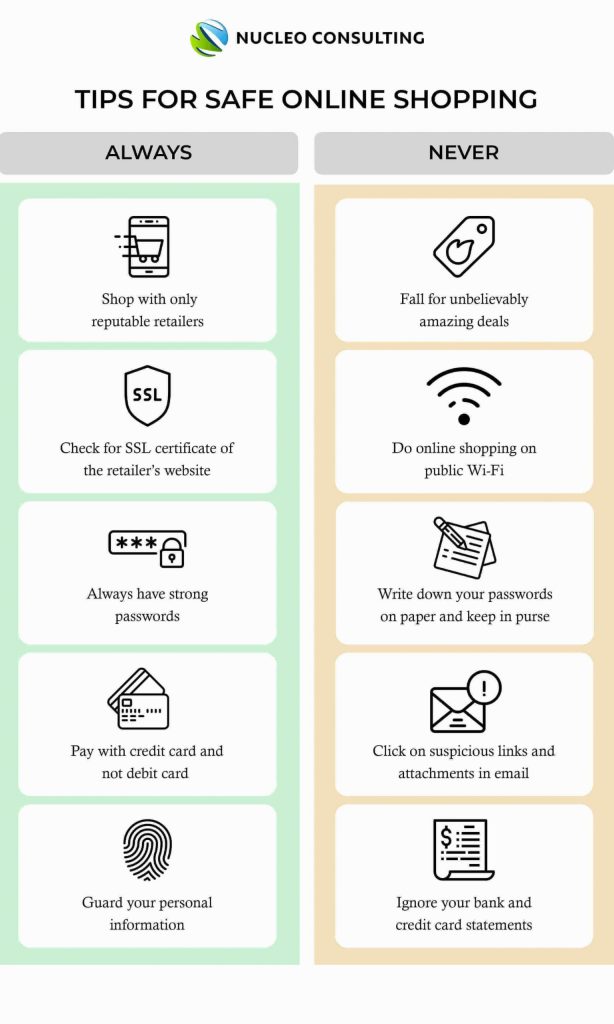10 Tips for a Safe Online Shopping Experience
The e-commerce industry, or online shopping as it is more popularly known, has grown leaps and bounds in the last decade. Shopping from the comfort of one’s home, quick and hassle-free payments, along with next-day delivery are some of the incentives for online shoppers that are hard to resist.
However, while this channel brings a lot of positives, it comes with a few negatives as well. The cyber threat of online scammers and data theft can ruin your personal and financial life if you are not careful about your internet security.
The Cyber Security Agency of Singapore in their Singapore Cyber Landscape 2020 Report reported to have received 16,117 cases of cybercrime—an increase of more than 6,500 cases from 2019. As the number of people falling for such scams increases each day, the agency also released a press release on spreading awareness of such scams.
In this article we list out the 10 most essential things you should do to save yourself from such threats while shopping online.

1. Reputable Retailers
Shop only with reputable retailers: Do your homework on the credentials of the online retailer before you decide to shop. Check for reviews from their past customers. See what those with negative reviews had to say. In case you are unable to find reviews, visit https://www.acra.gov.sg/ and see whether they are legit, have an office address, and can be reached on the mentioned contact coordinates.
2. Too good to be true
Don’t fall for unbelievably amazing deals: The quickest way to grab the maximum number of eyeballs for any scammer is to come up with jaw-dropping deals. Follow the golden principle – “If it is too good to be true, then it probably is”. It is better to stay away from such deals that common sense tells you can’t be true.
3. Avoid public Wi-Fi
Don’t browse on public Wi-Fi: Avoid shopping online from a public Wi-Fi, sitting in a coffee shop. First, you never know if someone is snooping in on your browsing behavior. Second, you could end up presenting your identity to a hacker, including your name, address and credit card number. If ever you have to use a public Wi-Fi, use a VPN (virtual private network) so that hackers may not be able to break in.
4. Using strong passwords
Always have a strong password: It is natural for many to choose a password that is easy to remember, like family name, birthday, anniversary, or just a simple alphanumeric string such as “abc123” etc. Avoid doing so at all costs. Such passwords can be guessed easily if the hacker happens to know you, or has already stolen your identity.
5. Avoid writing down passwords
Never write down your passwords: Some people have a habit of forgetting their passwords and hence they prefer to write them down on paper and keep them in a wallet or a drawer. They unwittingly help scammers and thieves to wreak havoc in their lives by doing so.
6. SSL certificates
Check for SSL certificate of the website: SSL or Secure Socket Layer encryption gives you an added layer of protection that masks your information when you transact. Check for the url of the website. If it says “https”, it is secure. If it just says “http”, it doesn’t have SSL. Additionally, don’t confuse a flashy website with its trustworthiness. Just because the website is swanky, doesn’t mean it can be trusted.
7. Email scams
Beware of email scams: Some fraudsters may use catchy and attention grabbing subject lines and place an attachment or a url link to a spurious website. Never fall for such tricks. Don’t click on any attachment or link unless you trust the sender. Delete such emails from your inbox immediately and report them as spam.
8. Debit or Credit card?
Pay with Credit and not Debit card: Credit card information theft doesn’t give access to your bank to the fraudsters. Additionally, almost every credit card company has a robust fraud-protection program mandated by law, and ways to detect a fraudulent transaction the moment it occurs. They also shield you against any liability arising out of such a theft.
9. SSN/ OTP
Guard Your personal information: Never give away your SSN/OTP (social security number or one time passwords) for an e-commerce transaction. If a website is asking you to enter personal details that are typically not required for the transaction to take place, it is best advised to abort the transaction and stay away.
10. Bank statements
Check your bank statements periodically: It may get a bit cumbersome and tedious at times, but you must keep an eye for any transaction on your bank or credit card statements that you don’t remember making. Report it to the bank immediately.
In summary, while the online world has brought about great convenience, it has also given a great opportunity to scammers to thrive on the gullible. The best way to avoid becoming a victim is to stay vigilant and guard your information when you shop online.
